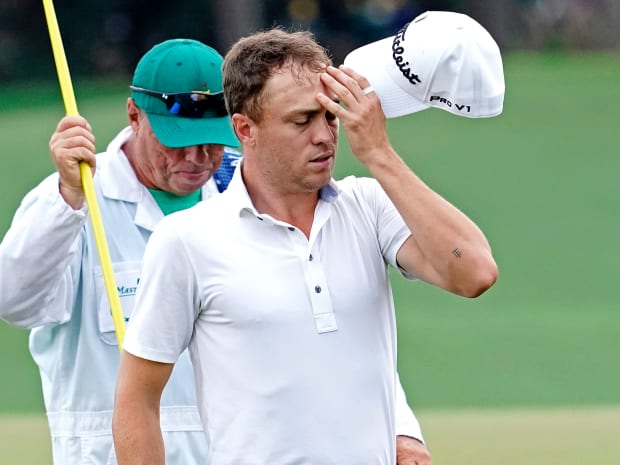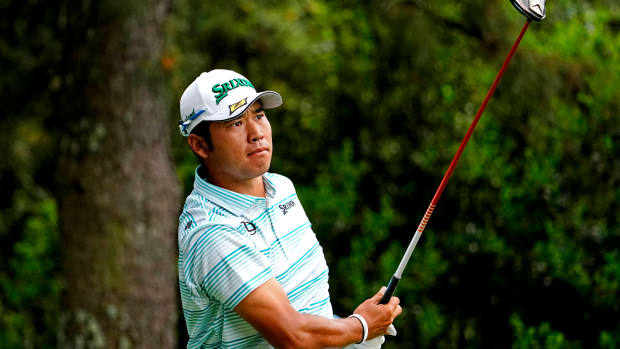Defending a big lead on a Sunday at Augusta can be a formidable task, especially for a man trying to become the first Japanese man to win a major.
The final pairing at the Masters will tee off at 2:40 p.m. on Sunday, which gives Hideki Matsuyama about 19 hours to think about his four-stroke lead. Maybe he can spend some of that time watching Justin Thomas replays from Saturday. To win his first green jacket, Matsuyama needs to make sure that what happened to Thomas does not happen to him.
After a 77-minute weather delay, Thomas bogeyed Nos. 9 and 11 and birdied No. 12. He strode to the par-5 13th at 4-under, three strokes off the lead. Then he lost the Masters.

Thomas hit his drive right, into the trees. He executed his second shot well: a low draw off the pine straw through an opening and into the fairway. He was 81 yards away for his third shot. He could not hit a full wedge shot from there. He tried to hit his one high and land it softly beyond the pin. Instead, he chunked the ball into the creek, where it bobbed along before slowly drowning. He had to take a penalty stroke, meaning he was trying to chip over a creek for par. He hit his chip 35 feet past the hole instead. The rain had softened the greens, and he left his bogey putt eight feet short. His putt for double bogey slid past the hole. Finally, mercifully, he holed out for an 8—on a hole where he would usually hope for a 4.
He played the rest of the day at even par. It didn’t matter.
“It just sucks to shoot yourself pretty much out of it in a 10-hole stretch,” he said.
The rain—and, he said, his failure to adjust to it—ruined Thomas’s weekend. Meanwhile, Matsuyama was grateful for it. Before play was suspended, he hit what he called his “worst shot of the week,” a drive well into the trees on the right side of No. 11. He spent the delay in his car, playing video games on his phone, then emerged to hit every ball perfectly.
“I just figured, I can't hit anything worse than that,” he said afterward. “And so maybe it relieved some pressure.”
Matsuyama ended up birdieing No. 11. He birdied No. 12. He eagled No. 15, then birdied Nos. 16 and 17 to turn in the first bogey-free round of the event, a 65. He will play on Sunday with a chance to become the first Japanese man to win a major. The trick for him will be not to think too much about his position.
“This will be a new experience for me, being a leader going into the final round in a major,” he said. “I guess all I can do is just relax as I can tonight, prepare well and just do my best tomorrow.”
Defending a big lead on a Sunday at Augusta can be a formidable task. In 2011, Rory McIlroy led by four strokes before an 80 dropped him to a tie for 15th place. In 1979, Ed Sneed entered the final round with a five-shot lead. He shot a 76 and watched Masters rookie Fuzzy Zoeller slip on the green jacket. And, of course, in ’96, Greg Norman opened Sunday with a six-stroke advantage and closed it with a 78, still tied for the worst collapse in PGA Tour history. “I don't know what to say,” Nick Faldo, who won, told Norman. “I just want to give you a hug. I feel horrible about what happened. I'm so sorry.”
Those men let the pressure get to them. Matsuyama believes he is in a better position, in part because COVID-19 protocols have reduced the number of Japanese reporters at the course.
“I'm glad the media are here covering it, but it's not my favorite thing to do, to stand and answer questions,” he said. “And so with fewer media, it's been a lot less stressful for me, and I've enjoyed this week.”

Matsuyama will play alongside Xander Schauffele, who is tied for second with Marc Leishman, 36-hole leader Justin Rose and first-timer Will Zalatoris. Leishman was paired with Adam Scott on Sunday in 2013, the year Scott won here, and with Patrick Reed on Saturday in ’18, the year Reed won. So he has an idea of what the leaders have to do. “You don't have to be perfect, but you have to do everything pretty well,” Leishman said. “You can make mistakes, but as long as they're only small mistakes.”
Thomas would have to “do something historic” to win on Sunday, he said after his meltdown. He probably won’t. Matsuyama is guaranteed to make history. He just hopes it’s the good kind.